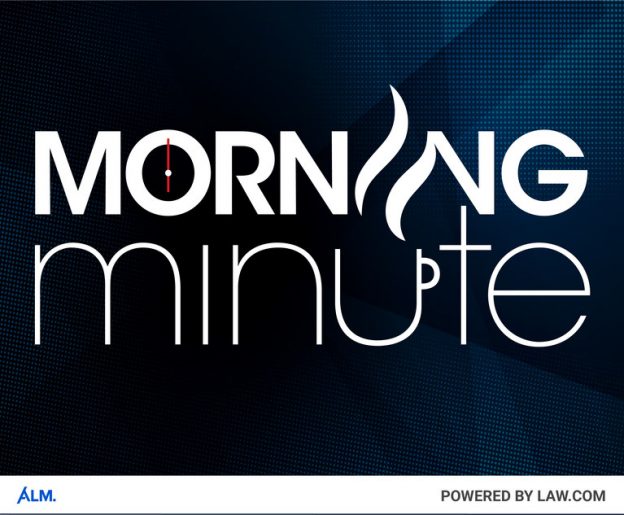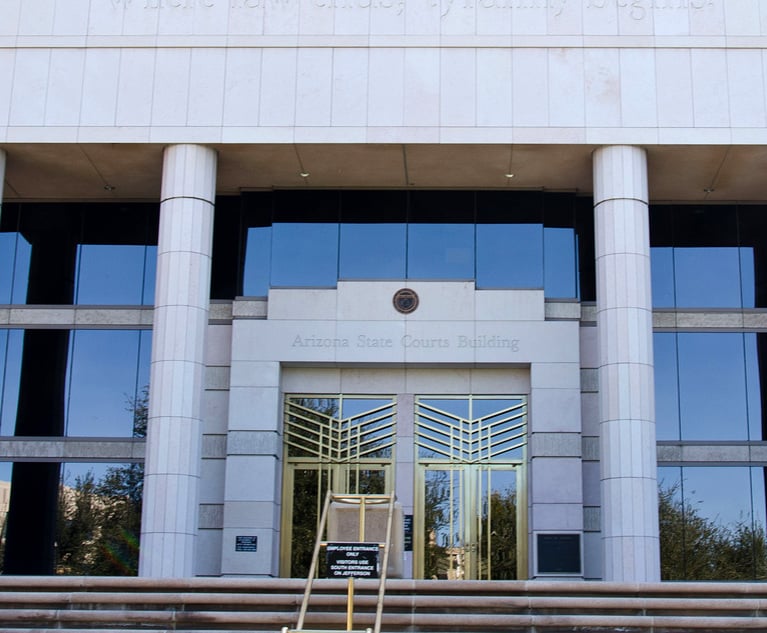Law Firm Equity Partner Tier Growth Is Lagging: The Morning Minute
The news and analysis you need to start your day.
June 03, 2022 at 06:00 AM
5 minute read

Want to get this daily news briefing by email? Here's the sign-up.
WHAT WE'RE WATCHING
PANDEMIC PROGRESS - The COVID-19 pandemic served to level the playing field for many disabled law students—at least for a while. "Accommodations suddenly became available because everyone needed them," Britney R. Wilson, associate professor of law and director of the Civil Rights and Disability Justice clinic at New York Law School, told Law.com's Christine Charnosky, adding that "it opened up [opportunities] for people with disabilities." But as the pandemic wanes, Wilson noted, "We are seeing those options going away." When everyone had to be remote, accommodations had to be granted, but now those accommodations are once again being framed as differential treatment, according to Wilson. "Schools are showing a flagrant disregard for disabled students and public health" as they become more determined to get everyone back in person, Marissa Ditkowsky, a staff attorney at Tzedek DC and executive director of the National Disabled Law Students Association (NDLSA), told Law.com. With masks mandates lifted, it feels like nobody cares about those who are immunocompromised, Ditkowsky, who has myotonic dystrophy, said. "The pandemic made things a bit easier with remote learning, but a lot of schools and employers will bounce back like it never happened," she said.
PARTNER PARITY PROBLEM - Law firms have been shaken at the lower levels of their rosters by the Great Resignation. But they're also being pulled apart at the top, as they continue growing their income, nonequity and other alternative partner tiers faster than their traditional equity ranks, Law.com's Andrew Maloney reports. While the number of nonequity partners throughout the Am Law 200 has grown 43% over the last decade, the number of equity partners has only increased by 11%. And in spite of historically great financial results, the number of equity partners across both the Am Law 100 and Second Hundred firms was essentially flat last year. No doubt some of the split is a bottom-up phenomenon, as veteran lawyers look to alternative paths where they can stay in Big Law while mitigating some of the headaches caused by the responsibilities of partnership. But the shift is also being driven by the quest for efficiency in a high-demand environment, as firms look to those alternative tracks to get the benefits of experience without all of the cost. And, analysts say, while the industry has work to do to make partnership seem more attainable—particularly for diverse lawyers—the value generated by firms can understandably make partners protective of their profits. "You're still talking about essentially trying to find new owners for your business," says Bill Josten, strategic content manager for Thomson Reuters Institute. "There is still a strong argument to be made for being discerning, because these people are responsible for the future success of your firm, and the livelihoods of a lot of people ride on that."
TRADE TROUBLE - Charles Schwab, a financial services holding company, was hit with an antitrust class action Thursday in Texas Eastern District Court over the company's merger with TD Ameritrade. The lawsuit was filed by Bathaee Dunne LLP on behalf of retail investors who contend that the merger has "substantially decreased" competition, with a significantly less transparent process that causes customers to make less money through trades while paying higher transaction costs. Counsel have not yet appeared for the defendant. The case is 4:22-cv-00470, Corrente et al v. The Charles Schwab Corporation. Stay up on the latest deals and litigation with the new Law.com Radar.
EDITOR'S PICKS
| Durham Investigation Verdict Revives Trump-Era Claims of Politicization at DOJ By Andrew Goudsward |
This content has been archived. It is available through our partners, LexisNexis® and Bloomberg Law.
To view this content, please continue to their sites.
Not a Lexis Subscriber?
Subscribe Now
Not a Bloomberg Law Subscriber?
Subscribe Now
NOT FOR REPRINT
© 2025 ALM Global, LLC, All Rights Reserved. Request academic re-use from www.copyright.com. All other uses, submit a request to [email protected]. For more information visit Asset & Logo Licensing.
You Might Like
View All
KPMG Wants to Provide Legal Services in the US. Now All Eyes Are on Their Big Four Peers


The Law Firm Disrupted: With KPMG's Proposed Entry, Arizona's Liberalized Legal Market is Getting Interesting

Turning Over Legal Tedium to AI Requires Lots of Unglamorous Work on Front End
6 minute readLaw Firms Mentioned
Trending Stories
- 1'Not the President's Personal Lawyer': Lawyers Share Concerns Over How AG Pick Bondi’s Loyalism to Trump May Impact DOJ
- 2US Judge OKs Partial Release of Ex-Special Counsel's Final Report in Election Case
- 3The Demise of Truth and Transparency in Federal Sentencing
- 4Former Phila. Solicitor Sozi Tulante Rejoins Dechert
- 5'I've Seen Terrible Things': Lawyer Predicts Spike in Hazing Suits
Who Got The Work
Michael G. Bongiorno, Andrew Scott Dulberg and Elizabeth E. Driscoll from Wilmer Cutler Pickering Hale and Dorr have stepped in to represent Symbotic Inc., an A.I.-enabled technology platform that focuses on increasing supply chain efficiency, and other defendants in a pending shareholder derivative lawsuit. The case, filed Oct. 2 in Massachusetts District Court by the Brown Law Firm on behalf of Stephen Austen, accuses certain officers and directors of misleading investors in regard to Symbotic's potential for margin growth by failing to disclose that the company was not equipped to timely deploy its systems or manage expenses through project delays. The case, assigned to U.S. District Judge Nathaniel M. Gorton, is 1:24-cv-12522, Austen v. Cohen et al.
Who Got The Work
Edmund Polubinski and Marie Killmond of Davis Polk & Wardwell have entered appearances for data platform software development company MongoDB and other defendants in a pending shareholder derivative lawsuit. The action, filed Oct. 7 in New York Southern District Court by the Brown Law Firm, accuses the company's directors and/or officers of falsely expressing confidence in the company’s restructuring of its sales incentive plan and downplaying the severity of decreases in its upfront commitments. The case is 1:24-cv-07594, Roy v. Ittycheria et al.
Who Got The Work
Amy O. Bruchs and Kurt F. Ellison of Michael Best & Friedrich have entered appearances for Epic Systems Corp. in a pending employment discrimination lawsuit. The suit was filed Sept. 7 in Wisconsin Western District Court by Levine Eisberner LLC and Siri & Glimstad on behalf of a project manager who claims that he was wrongfully terminated after applying for a religious exemption to the defendant's COVID-19 vaccine mandate. The case, assigned to U.S. Magistrate Judge Anita Marie Boor, is 3:24-cv-00630, Secker, Nathan v. Epic Systems Corporation.
Who Got The Work
David X. Sullivan, Thomas J. Finn and Gregory A. Hall from McCarter & English have entered appearances for Sunrun Installation Services in a pending civil rights lawsuit. The complaint was filed Sept. 4 in Connecticut District Court by attorney Robert M. Berke on behalf of former employee George Edward Steins, who was arrested and charged with employing an unregistered home improvement salesperson. The complaint alleges that had Sunrun informed the Connecticut Department of Consumer Protection that the plaintiff's employment had ended in 2017 and that he no longer held Sunrun's home improvement contractor license, he would not have been hit with charges, which were dismissed in May 2024. The case, assigned to U.S. District Judge Jeffrey A. Meyer, is 3:24-cv-01423, Steins v. Sunrun, Inc. et al.
Who Got The Work
Greenberg Traurig shareholder Joshua L. Raskin has entered an appearance for boohoo.com UK Ltd. in a pending patent infringement lawsuit. The suit, filed Sept. 3 in Texas Eastern District Court by Rozier Hardt McDonough on behalf of Alto Dynamics, asserts five patents related to an online shopping platform. The case, assigned to U.S. District Judge Rodney Gilstrap, is 2:24-cv-00719, Alto Dynamics, LLC v. boohoo.com UK Limited.
Featured Firms
Law Offices of Gary Martin Hays & Associates, P.C.
(470) 294-1674
Law Offices of Mark E. Salomone
(857) 444-6468
Smith & Hassler
(713) 739-1250








